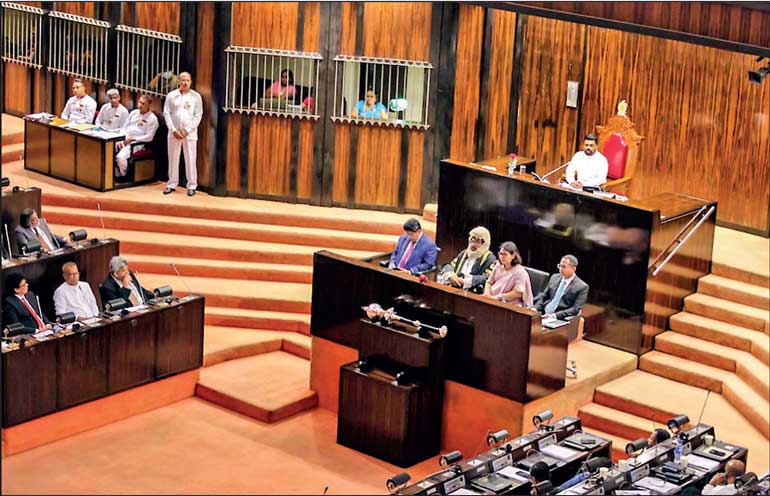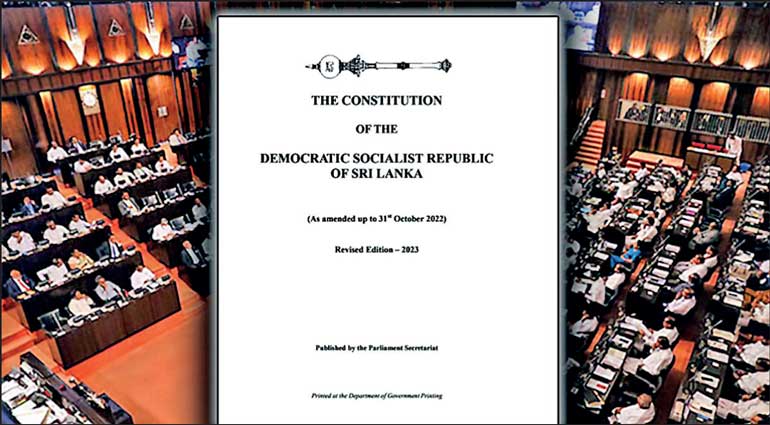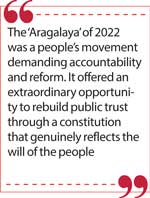Friday Feb 13, 2026
Friday Feb 13, 2026
Thursday, 13 November 2025 00:24 - - {{hitsCtrl.values.hits}}

A strong Constitution protects citizens’ rights, guarantees equality before the law, and ensures efficient, transparent, and accountable governance

Parliament of Sri Lanka and the Constitution
 A nation at a crossroads
A nation at a crossroads
The economic and social crises of 2022 marked a turning point in Sri Lanka’s modern history. They forced the nation to confront an uncomfortable truth: our constitutional framework—designed to centralise political power—has long contributed to national decline.
Out of that turmoil emerged a renewed call for genuine constitutional reform—a demand for a fair, people-centred system built on peace, prosperity, and zero tolerance for corruption. The current government was elected on this mandate and pledged to complete this long-overdue task. It is now the duty of every citizen to ensure that the promise is fulfilled. Drafting, debating, and passing a new constitution—culminating in a national referendum—may take more than two years. By then, political rivalries could once again derail progress.
Learning from history
Since its independence in 1948, Sri Lanka has adopted three constitutions. The first, drafted by Sir Ivor Jennings, followed the Westminster model. The 1972 Constitution declared Sri Lanka a republic, while the 1978 Constitution introduced the executive presidency—later amended 22 times—concentrating power in the hands of a few and weakening constitutional governance.
Global experience shows that countries adopting executive presidencies without adequate checks and balances often drift toward authoritarianism and economic stagnation. In contrast, Commonwealth nations that retained parliamentary democracy—such as the United Kingdom, Canada, Australia, New Zealand, India, Malaysia, and Singapore—have generally prospered.
Meanwhile, nations that embraced presidential systems, blurring the separation of powers—such as Sri Lanka, Zimbabwe, Pakistan, and Nigeria—have faced recurring instability. The Nordic countries, consistently ranking among the world’s strongest democracies, further demonstrate that democratic governance and development go hand in hand.
A chance for renewal
The ‘Aragalaya’ of 2022 was a people’s movement demanding accountability and reform. It offered an extraordinary opportunity to rebuild public trust through a constitution that genuinely reflects the will of the people.
Parliament must act now to safeguard this process—possibly through a two-thirds majority—to ensure reform remains free from political manipulation and that current representatives can complete their terms without disruption. Delaying tactics disguised as “further deliberation” must be resisted. Issues such as delimitation should not hinder progress; a nationwide referendum will ultimately decide the final constitution. After decades of politics defined by ethnicity, religion, and region, the public has had enough of division. Reform delayed is reform denied.
Principles for a people’s Constitution
A strong constitution protects citizens’ rights, guarantees equality before the law, and ensures efficient, transparent, and accountable governance. Sri Lanka’s next constitution must:
Practical governance for a small nation
With a population of just 22 million, Sri Lanka does not need a sprawling political system modelled on global superpowers. What the country needs is an affordable, efficient, and accountable structure that reflects the people’s will and reinforces our identity as a Democratic Socialist Republic.
 Our existing three-pillar system aligns with liberal democratic principles, but the 1978 reforms and subsequent amendments distorted that balance. It is time to restore effective governance through a unitary model—one national government with clearly defined, limited powers delegated to autonomous provincial administrations. This model can empower regions to develop their unique strengths in culture, resources, and values, within a single national framework of security and stability.
Our existing three-pillar system aligns with liberal democratic principles, but the 1978 reforms and subsequent amendments distorted that balance. It is time to restore effective governance through a unitary model—one national government with clearly defined, limited powers delegated to autonomous provincial administrations. This model can empower regions to develop their unique strengths in culture, resources, and values, within a single national framework of security and stability.
In an increasingly interconnected world, unity combined with local autonomy is not just a moral imperative—it is an economic and strategic necessity.
Building accountability into the future
Every constitution must evolve. We therefore propose the establishment of a permanent, independent Constitutional Commission composed of designated representatives from multiple disciplines, professional bodies, social sectors, and regional nominees. This body would periodically evaluate the constitution’s performance, identify weaknesses, and recommend reforms to ensure its continued relevance and effectiveness.
Such a mechanism would ensure that the constitution remains relevant in a rapidly changing geopolitical environment—protecting Sri Lanka’s sovereignty, avoiding dependency, and preventing the nation from becoming a pawn in global power politics or trapped once again in unsustainable debt.
Sri Lanka has the wisdom and capacity to craft a constitution that reflects its people’s aspirations, strengthens democratic governance, and safeguards cultural values. Now is the moment to act—calmly, rationally, and united in purpose—before political inertia squanders this rare opportunity.
The way forward
The success of this endeavour depends on building strong institutions—an independent judiciary, a robust legislature, a free press, an efficient bureaucracy, and adequate checks and balances. Our focus must be on empowering systems, not individuals.
Detailed discussions and consensus statements from the LEADS Forum are available at www.srilankaleads.com under the “Sunday Meetings” tab.
(Jayampathy Wickramaratne is a President’s Counsel and an academic, Ranjan de Silva is Brigadier and a lawyer, Anura de Silva is a Citizen Activist, and Chula Goonasekera is a Medical reformist and an academic on behalf of the LEADS Forum - [email protected])